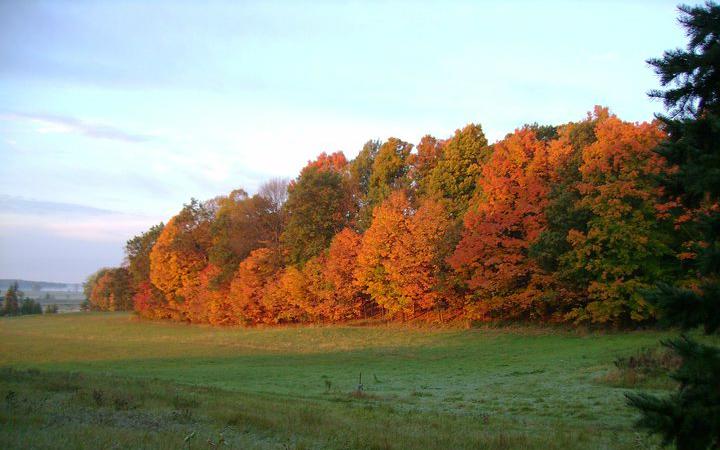The great American cranberry thrives in the ‘world’s smallest’ organic bog
The Ruesch Century Farm, near Vesper, Wisconsin, claims it's "the world's smallest organic cranberry bog."
As the story goes, Native Americans — specifically, Algonquins — introduced the Pilgrims to the cranberry at Plymouth, Massachusetts. Nowadays, the tart, bright red fruit holds an honored place at the traditional American Thanksgiving feast.
Few cranberry growers have come to the modern organic movement, however. A rare exception is the popular 140-year-old Ruesch Century Farm near Vesper, Wisconsin, which advertises itself as “the world’s smallest organic cranberry bog.”
The Ruesch Farm uses no pesticides, herbicides or chemicals — carrying on a practice that owner Bill Ruesch says was passed on to him by his father.
“In 1879, my great-grandfather moved from Milwaukee, Wisconsin, to the present farm. So, I'm the fourth-generation owner,” says Ruesch. "It was a dairy farm, of course, for many years, and then in 1990, my father, who had basically paid for the farm working on cranberry marshes in the fall while he was a young man in his 20s, planted about a quarter-acre of cranberries. As it turns out, it was the first what they call ‘upland cranberry bog’ in the state of Wisconsin.”
Read more: This chef is cooking Native Thanksgiving meals for everyone at Standing Rock
In addition to that, Ruesch, says, his father never believed in using chemicals. He grew his cranberries without any herbicides, pesticides or chemical fertilizers. “The big cranberry growers in the area laughed at him and said, ‘Listen, you can't do that. You have to use all these different chemicals in order to keep the pests away and effectively grow cranberries,’” Ruesch says. “So, we became the first certified organic cranberry grower in Wisconsin, and I guess the rest is history.”
Many people tell Ruesch they can definitely taste the difference, he says. “More flavor. It's maybe a little higher sugar content … I don't eat other people's cranberries. I just eat my own, so I really can't answer that for myself. But listening to other people, they believe that they can tell the difference.”
Since the farm uses no chemicals and occasionally floods the cranberry bog at the end of the season, local wildlife is thriving, too.
“There is all kinds of wildlife on the farm,” Ruesch says. “I’ve noticed an increase in frogs and an increase in snakes and that type of thing over the years, which is a good thing. Those are the type of things that, if you see an increase or decrease, tell you a little bit about the environment they're living in. Being that we don't use any pesticides or herbicides, I would guess there are probably a lot of very small insects and that type of thing that thrive that normally wouldn’t."
The insects are harder to control than in “conventional” farming, but flooding the beds in late May takes away a particularly pesky insect called the blackheaded fireworm, Ruesch says. “[Flooding] does a pretty effective job of killing the initial flight of that pest, which can really do some damage to your crop if they get too high in numbers.”
Ruesch relishes working in his bogs during the time leading up to Thanksgiving. “It's a wonderful experience, because the birds, the Canadian geese and the sandhill cranes by the thousands are on the farm and near the other farms around us,” he says. “The constant honking and their flying overhead is really a terrific experience. So, while other people might be behind their desks, we're out there picking the berries and enjoying a nice fall afternoon. It’s kind [of] hard to beat.”
If you haven’t yet prepared your cranberries for this year’s feast, here is a favorite Ruesch family recipe for cranberry nut pie:
Mother Ruesch's Cranberry Nut Pie
Ingredients:
1.25 cups of fresh or frozen organic cranberries
0.25 cup brown sugar
0.25 cup chopped walnuts
1 egg
0.5 cup granulated sugar
0.33 cup butter or margarine, melted
0.5 cup all-purpose flour
Preheat the oven to 325 F. Butter a nine-inch pie plate and layer the cranberries on the bottom. Sprinkle with brown sugar and nuts. In a bowl beat the egg until thick and then gradually add the sugar. Stir in flour and melted butter and blend well. Pour that over the cranberries and bake for 45 minutes. When done serve with ice cream or whipped cream.
This article is based on an interview that aired on PRI’s Living on Earth with Steve Curwood.
